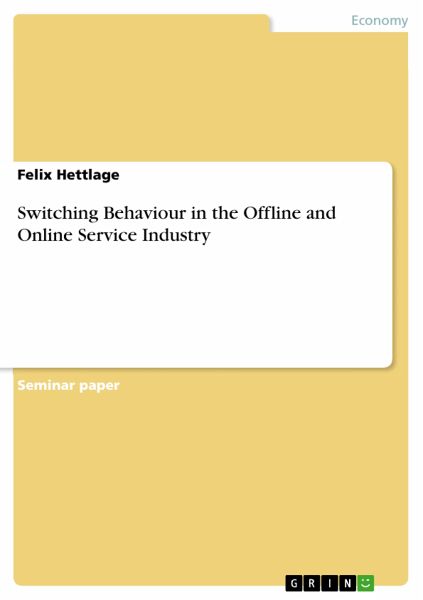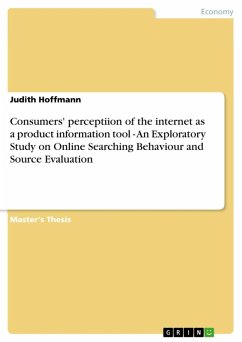
Switching Behaviour in the Offline and Online Service Industry (eBook, ePUB)
Sofort per Download lieferbar
15,99 €
inkl. MwSt.

PAYBACK Punkte
0 °P sammeln!
Seminar paper from the year 2002 in the subject Business economics - Offline Marketing and Online Marketing, grade: 2,3 (B), Maastricht University (Faculty of Economics and Business Administration), language: English, abstract: When in the early 90s the internet became a mass medium, the service industry recognized the potential of this new media. Quickly, several online service providers like Yahoo or AOL were established. These new internet companies tried to take advantage of being the first mover, by acquiring new customers. In the beginning this was fine, since more and more people obtain...
Seminar paper from the year 2002 in the subject Business economics - Offline Marketing and Online Marketing, grade: 2,3 (B), Maastricht University (Faculty of Economics and Business Administration), language: English, abstract: When in the early 90s the internet became a mass medium, the service industry recognized the potential of this new media. Quickly, several online service providers like Yahoo or AOL were established. These new internet companies tried to take advantage of being the first mover, by acquiring new customers. In the beginning this was fine, since more and more people obtained access and became potential costumers. Following a typical situation of excess demand and hence, the established online service provider could afford to focus more on gaining new customers than on retaining existing ones. However, this picture turned completely the more popular the internet became and the more new start-ups saw their opportunities to penetrate the e-commerce arena. This led to a shift from excess demand to excess supply in the online service industry. Consequently, the situation of increased competition was followed by a loss of market share and lower profit margins and the strategy of steadily acquiring new customers became ever harder to pursue, so that the companies had to rethink their. In order to stay competitive the companies have to focus more on the retention of existing customers rather than on searching for new ones. This situation is comparable to the offline service industry. The offline service industry also experienced decades of prospering growth and now faces a situation of a saturated market. The acquiring of new customers has become extremely difficult and costly and retaining existing ones has become harder and harder due to an increased customer willingness to switch the service provider. With respect to today's rapidly changing economy, it becomes increasingly important for managers in both the offline and online service industry to explicitly identify the reasons that drive customers to switch their service provider. Additionally, it is also extremely important for the online industry, whether they can build on the experiences made in the offline service industry or whether these experiences and approaches are not valid in the internet world. Each of these facets will be illuminated, focusing the analysis on the following core question: Is the customer switching behaviour substantially different in the online service industry as compared to the offline industry? [...]
Dieser Download kann aus rechtlichen Gründen nur mit Rechnungsadresse in A, B, BG, CY, CZ, D, DK, EW, E, FIN, F, GR, HR, H, IRL, I, LT, L, LR, M, NL, PL, P, R, S, SLO, SK ausgeliefert werden.













